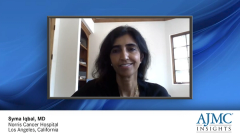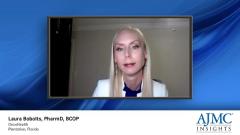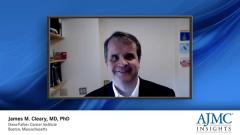
Unmet Needs for Patients With Esophageal and Upper-GI Cancers
Key opinion leaders navigate unmet needs across the treatment landscape of gastroesophageal cancer.
Episodes in this series

Laura Bobolts, PharmD, BCOP: The unmet need for patients with esophageal and upper–GI [gastrointestinal] cancers can be summed up in 1 way. What do we do after the patient progresses on targeted therapy, especially after a patient progresses on PD-1 inhibitor–based therapy? What do you use in the second line? One of the challenges from a managed care perspective is that treating oncologists may want to use another PD-1 inhibitor after disease progression on a PD-1 inhibitor in these cancers. In that scenario, we lack evidence-based medicine on whether the tumor will still respond to another trial after it has progressed on a PD-1 inhibitor. That’s the biggest unmet need, because these patients are palliative and their cancer is unfortunately going to progress. At that point, the oncologist needs to ask: what do we use next? What’s our second-line therapy? If we’re fortunate enough to get the patient to a third line of therapy, then what do you use?
A lot of our targeted therapies are in the frontline setting, which is great for improving survival for our patients, but we need more studies looking at second-line and later use of targeted therapies, specifically after progression of disease on PD-1 inhibitors. That’s a big unmet need. With GI, upper GI, and esophageal cancers [affecting] such a small patient population, from a payer’s perspective, I wouldn’t treat these patients any differently from other cancers, such as breast cancer or lung cancer. Even though it’s less common in incidence, it’s still a cancer in which the patient needs to be on the appropriate therapy.
A payer can leverage utilization management to be a second set of arms on the cancer patient’s care rather than a burden, especially if that payer can have representation of an oncology specialist on their end, the managed care side, with oncologists and board-certified oncology pharmacists. That extra review of that patient’s therapy is [similar to] an expert second opinion. Even in a small patient population of upper GI and esophageal cancers, patients should be able to benefit from additional services that payers can provide.
From my perspective, a payer likely wouldn’t treat these cancers differently from others. The 1 area in which I’ve seen different management is when a payer elicits a pathway vendor to analyze the regimens and to provide a subset of guideline-based regimens available to providers. Hopefully that’s not from a restrictive standpoint. Meaning that if a provider goes off pathway, it’s less likely that a payer would deny that therapy because there are very reasonable reasons to go off pathway.
Every patient with cancer is an individual. Pathway companies may not cover all cancers. From a payer’s perspective, that means that a provider might not be incentivized. Should a payer have a value-based care arrangement in place between the payer and the provider, then perhaps a provider may not be incentivized to prescribe a certain regimen in gastric cancer if that pathway isn’t developed for that cancer. For a payer to have pathways, I’d highly recommend that those pathways encompass all cancers—small and large—so that they can reward high-quality, cost-effective cancer care.
James M. Cleary, MD, PhD: There’s still a great unmet need in the treatment of patients with gastroesophageal adenocarcinoma. There have been strides. There have been a lot of new drugs approved over the last 2 years. But our patient outcomes still aren’t as good as we’d like. Patients are still living about a year to a year and a half on average. We’re looking for therapies that are going to increase the durability of the effectiveness of our treatments and allow our patients to live longer. There have been improvements, but we aren’t satisfied with these improvements. We need to do better.
Transcript edited for clarity.
Newsletter
Stay ahead of policy, cost, and value—subscribe to AJMC for expert insights at the intersection of clinical care and health economics.












